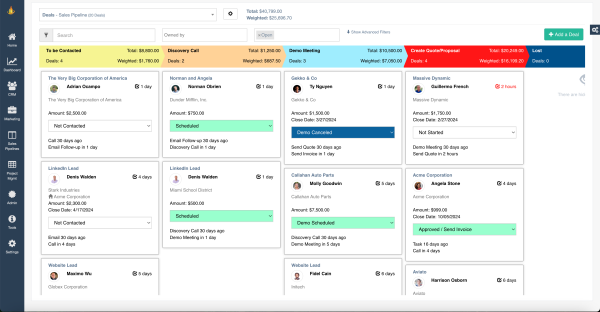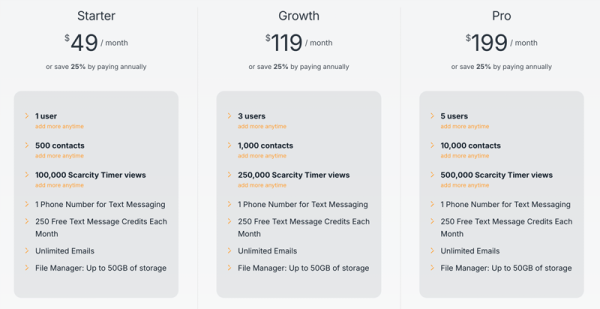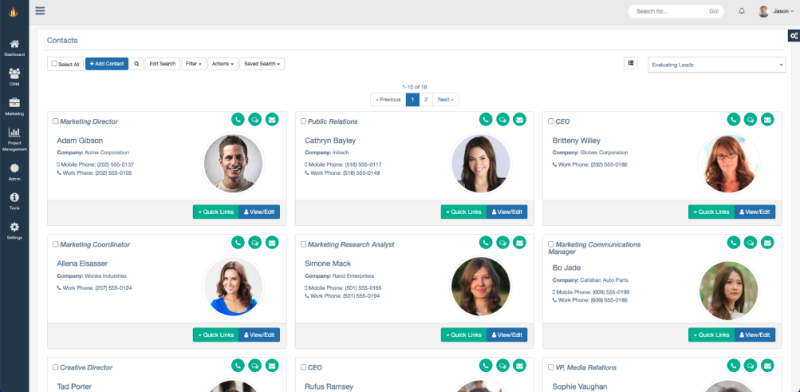Pulse advertises its CRM as a "simple but robust" solution. The CRM is feature-rich, cloud-based software that consolidates business activity and tools into one digital workspace. With Pulse, teams can collaborate and stay up-to-date in real time and on the go.
Despite being a lesser-known name in the CRM space, Pulse is steadily gaining a loyal user base because of its intuitive interface and outstanding customer onboarding and support.
Core Features
Pulse's CRM offers the core functions of a CRM, including customizable sales pipelines to manage leads and prospects, marketing and workflow automation, and client pipelines. Beyond the basic functions, other standout features include their dynamic project boards "designed for sales, marketing, fulfillment, and customer success" (as stated on their site), as well as the following functionalities:
- Drag and drop email builder
- Email marketing
- Text message marketing
- Personalized quotes & invoices
- Real-time reporting
- Franchise management
- Forecast sales
- Zapier & API integration
- Mobile application
Visit Pulse's website to learn about their full list of features.
Setting Up Pulse CRM
Pulse CRM's setup is more straightforward than most enterprise CRMs (read: Salesforce). New users can also access their step-by-step, guided onboarding tutorials that show how to set up the platform. They have dedicated support specialists to help with anything setup- and software-related, such as:
- Migrating and importing data from previous systems or spreadsheets
- Creating custom fields for your specific business needs
Setting up automation workflows for your marketing, sales, and administrative tasks - Integrating with your existing tools and applications
Customizing forms and templates for immediate use
This highly personalized, hands-on approach is a huge advantage when dealing with any technical barriers or issues. Particularly for smaller businesses, ongoing tech issues can be a dealbreaker that prevents businesses from fully optimizing and leveraging their CRM for their unique business needs.
The advantage of Pulse is that businesses can get their main workflows up and running in days (not months), so teams are up to speed and can see the benefits without much downtime. Pulse also offers advanced setup services and support for businesses with more complex requirements to build custom integrations and assistance with specific operational needs.
Design and Usability
Their clean design uses a modern interface with a dashboard that presents the most essential information without overwhelming the user. The simple drag-and-drop sales pipeline allows teams to review deals and updates in one space, with all data updated in real-time.
In the CRM section, all customer data and interactions are consolidated in one view, and the visual automation builder makes it easy to build custom automation.

Pulse CRM Sales Pipelines
Customization
The platform's customizability is a definite strength. From the sales pipeline to the customizable quote generator, Pulse incorporates the ability to customize across its CRM features. Several tools, such as the project boards, email marketing, text message marketing, and client/sales pipelines, have built-in customizability.
You can create custom fields and properties for essential areas and to store information for your customers and sales opportunities. The data fields support dropdowns, checkboxes, date selectors, and currency fields, to name a few.
Workflow automation can create multi-step sequences triggered instantly by customer behavior or internal milestones, with follow-up tasks initiated. Whether assigning tasks to team members, updating records, or improving efficiency, these automations are game-changers. Make sure to optimize Pulse's full range of automation and customizations.
Integration
Pulse has several native integrations already, with applications like Google Calendar and Calendly. It also integrates seamlessly with Zapier, Make & through their API. Using platforms like Zapier and Make gives you access to over 5,000 apps without any additional developer work. Additionally, these integrations allow Pulse to connect with almost any software in your technology stack—marketing tools, help desk solutions, accounting software, and other project management platforms.
They also have an open API for businesses with specialized requirements. This API enables custom integrations with proprietary systems or industry-specific apps. Pulse states that all customer data and other proprietary information remain secure while synchronizing third-party apps to the software.
Benefits of Using Pulse CRM
- Streamlined Sales Processes: Automated follow-ups, intuitive sales pipelines, and a swift quote generator can significantly improve work processes and outcomes. These features help free up time for your team to focus on what matters—your customers.
- Verification tools ensure data accuracy, crucial for maintaining accurate customer records and forecasting revenue growth.
- Integrated Marketing Tools—Built-in email marketing, SMS campaigns, and automation tools eliminate the need for numerous software subscriptions.
- Transparent Pricing – Most CRMs charge extra for advanced features, different modules, and other reasons. Pulse provides all features in every plan, making it a cost-effective solution for businesses of all sizes.
- Time-Saving Automation – Automating repetitive tasks like email follow-ups, customer outreach, and lead nurturing increases efficiency and reduces the likelihood of human error when communicating with clients.
- Enhanced Customer Experience – Businesses can improve communication and relationship management by centralizing customer interactions and automating responses.
- Scalability – Whether you're a solopreneur or a large organization, Pulse CRM’s robust features grow with your business, making it a long-term CRM solution.
Customer Support and Community Resources
Pulse has multi-channel support so that you can get the most out of the platform regardless of skill level. Direct support is available through phone and email, where you can expect to speak with a real person. Keep in mind that response times are generally quicker during main business hours.
Their personalized onboarding is a hands-on rather than DIY approach to setting up the software. For anyone new to CRMs, having customer support can be the difference between loving your CRM or not. Something Pulse has a reputation for is their customer support and collaborative onboarding effort.
The support staff seems to genuinely want to help. According to several reviews, they take the time to answer your questions or walk you through whatever you need help with.
Their self-paced resources include a comprehensive knowledge base and blog with guides, video tutorials, step-by-step instructions, and advanced configurations. Their articles cover everything from basic navigation to complex automation sequences, so you can access the resources you need.
Pricing and Value
A major draw of their solution is the transparent and simple payment plan. Pulse CRM offers straightforward pricing with all features included in each plan, ensuring businesses get the best value without hidden costs.
Pulse CRM’s pricing structure includes:
- Starter Plan: $49/month—Designed for small businesses and solopreneurs, this plan offers full CRM functionality with unlimited email sends and automation.
- Growth Plan: $119/month—Ideal for scaling businesses that require advanced reporting and automation workflows.
- Pro Plan: $199/month—This plan is best for established businesses requiring advanced analytics, extensive automation, and priority support.
As your business grows, you can easily add additional users and contacts to any plan.
Most CRMs charge extra for essential features; Pulse CRM ensures all tools are accessible at the gate. This unique pricing model is an excellent value for businesses looking for a robust CRM without incurring additional costs for necessary functionalities as they scale.

Pulse CRM Pricing
Honest Feedback from Real Users
Though a lesser-known platform, Pulse's user feedback is overwhelmingly positive. It has a 4.8 out of 5 stars on G2, with reviews praising the user-friendly design, highly intuitive interface, and ability to build complex automation and workflows.
A validated G2 reviewer says in their review that they appreciate the CRM because it "isn't an old CRM on a clunky platform like so many others ... This makes it responsive, intuitive, and easy to use".
Various other reviews reflect similar opinions: The platform's streamlined operations and consolidating tools in one workspace significantly boost productivity and efficiency. One drawback is that some found that there could be a learning curve for anyone unfamiliar with CRMs.

Pulse CRM Review from G2
Alternatives to Pulse CRM
While Pulse CRM is an excellent choice for many businesses, some alternatives are:
- HubSpot CRM—HubSpot is a formidable presence in the CRM market. The mass appeal stems from their free plan, which includes essential contact management tools to help you manage your leads and customers, making Hubspot understandably attractive for smaller, budget-conscious businesses. A downside of their software is that the pricing climbs quickly as you add advanced features, making it less scalable and affordable. You can go from the free plan to spending thousands per month, and then need to find another solution that can fit your budget.
- Pipedrive—A sales-focused CRM with strong pipeline management tools, Pipedrive is ideal for businesses that need a simple and intuitive platform for tracking sales activities. Their website [advertise](https://www.pipedrive.com/en/products)s an 'all-in-one' sales software and other products centred on 'activity-based selling'.
- Keap (formerly Infusionsoft)—Keap offers deep automation and email marketing capabilities, albeit at a higher cost. The general sentiment is that it's better suited to businesses with complex sales and marketing needs (and bigger budgets).
- ActiveCampaign—ActiveCampaign's best asset is its marketing automation, but the CRM lacks other built-in features, such as generating quotes and invoices. Regardless, it's a solid option for companies that prioritize email marketing over other sales-focused functionality.
| Pros | Cons | |
|---|---|---|
| Pulse CRM 4.8 Easy-of-use 5.0 Features 4.5 Pricing 5.0 Scalability 4.0 Customer Support 4.5 | Pros:
| Cons:
|
| 4.0 Easy-of-use 4.0 Features 4.5 Pricing 3.0 Scalability 4.0 Customer Support 4.5 | Pros:
| Cons:
|
| 3.8 Easy-of-use 4.5 Features 3.5 Pricing 4.0 Scalability 3.5 Customer Support 3.5 | Pros:
| Cons:
|
| 4.0 Easy-of-use 4.0 Features 4.5 Pricing 3.0 Scalability 4.0 Customer Support 4.5 | Pros:
| Cons:
|
| 4.0 Easy-of-use 4.0 Features 4.5 Pricing 3.0 Scalability 4.0 Customer Support 4.5 | Pros:
| Cons:
|
Key Takeaways: Pulse CRM
Upon review, it's easy to see why Pulse is steadily gaining steam in the CRM space in 2025. Aside from the literal software, the support you'll receive from their staff is unmatched in the tech industry (just read the user reviews).
Additionally, access to every feature on each plan is a significant advantage and cost-effective in the long run. This is why Pulse CRM is the most scalable CRM; you won't need to pay for more subscriptions as you require more out of your CRM as you scale.
Other strengths are its collaborative work environment, intuitive visualization of the sales lifecycle, and customizability.
- All-inclusive platform with transparent pricing — All features in every plan with transparent pricing starting at $49/month, making it accessible for businesses of all sizes without hidden costs or required add-ons.
- Comprehensive automation capabilities—Pulse streamlines sales processes, lead nurturing, and customer follow-ups through powerful automation tools that reduce manual tasks and human error.
- Hands-on personalized setup and support—Dedicated onboarding assistance to help businesses configure automation workflows, migrate data, and customize the platform to their specific needs.
- Unified business toolset—By integrating email marketing, quoting tools, SMS campaigns, and detailed analytics in one platform, Pulse CRM reduces technology stack complexity and costs while providing a centralized hub for all customer-related activities.
FAQs
All features are included in one single package, eliminating the need for additional purchases or third-party integrations as your business grows.
Yes, the CRM offers extensive customization, allowing users to tailor automation, pipelines, project boards, and templates to their workflow.
Yes. Pulse CRM provides automation tools for follow-ups, lead nurturing, and sales processes.
They offer live phone and email support, personalized onboarding, and an extensive knowledge base to assist users. The support team is trained to respond quickly to all inquiries to minimize disruption to your workflow.
The CRM has two-factor authentication and is designed with top-tier security in mind.


